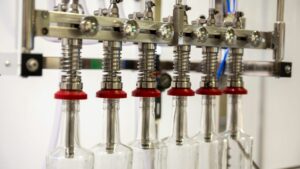Table of Contents
Toggle
In the fast-paced world of manufacturing, efficiency and precision are paramount. Filling machines have become indispensable tools in various industries, particularly in the food and beverage sector. These machines are designed to fill containers with a precise amount of product, ensuring consistency and reducing waste. As consumer demand grows and production scales up, the need for advanced filling solutions becomes more critical. This article delves into the role of filling machines, with a particular focus on automatic bottling machines, and how they optimize large-scale beverage manufacturing.
Automatic bottling machines: optimizing large-scale beverage manufacturing
In the beverage industry, the need for speed and accuracy in bottling processes cannot be overstated. Automatic bottling machines have revolutionized the way beverages are packaged, offering a seamless solution that enhances productivity while maintaining high standards of quality. These machines are equipped with advanced technology that allows for precise control over the filling process, minimizing spillage and ensuring that each bottle contains the exact amount of liquid.
One of the key advantages of automatic bottling machines is their ability to handle a wide range of bottle sizes and shapes. This flexibility is crucial for manufacturers who need to cater to diverse market demands. Additionally, these machines can be integrated with other packaging systems, such as labeling and capping machines, to create a fully automated production line. This integration not only speeds up the manufacturing process but also reduces the likelihood of human error, leading to a more efficient and reliable operation.
Moreover, automatic bottling machines are designed with sustainability in mind. Many models are equipped with features that reduce energy consumption and minimize waste, aligning with the growing trend towards environmentally friendly manufacturing practices. By investing in these machines, companies can not only improve their operational efficiency but also enhance their corporate social responsibility efforts.
The technological advancements driving filling machine innovation
The evolution of filling machines is closely tied to technological advancements. Modern filling machines are equipped with sophisticated sensors and control systems that allow for real-time monitoring and adjustments. This capability is particularly important in industries where precision is critical, such as pharmaceuticals and cosmetics. By leveraging technology, manufacturers can ensure that their products meet stringent quality standards while optimizing their production processes.
Another significant development in filling machine technology is the use of robotics and automation. Robotic arms and automated systems can perform complex tasks with high precision and speed, reducing the need for manual intervention. This not only increases the efficiency of the production line but also enhances worker safety by minimizing the risk of accidents.
Furthermore, the integration of the Internet of Things (IoT) in filling machines has opened up new possibilities for data collection and analysis. By connecting machines to a central network, manufacturers can gather valuable insights into their operations, identify areas for improvement, and make data-driven decisions. This level of connectivity also facilitates predictive maintenance, allowing companies to address potential issues before they lead to costly downtime.
The future of filling machines in manufacturing
As industries continue to evolve, the demand for more advanced and efficient filling machines is expected to grow. The future of filling machines lies in further automation and the integration of artificial intelligence (AI). AI-powered systems can analyze vast amounts of data to optimize filling processes, predict maintenance needs, and even adapt to changing production requirements in real-time.
In addition to technological advancements, there is also a growing emphasis on sustainability in manufacturing. Future filling machines are likely to incorporate more eco-friendly features, such as energy-efficient motors and recyclable materials. By prioritizing sustainability, manufacturers can reduce their environmental impact while meeting the expectations of increasingly eco-conscious consumers.
In conclusion, filling machines play a crucial role in modern manufacturing, particularly in the beverage industry. With the advent of automatic bottling machines and other technological innovations, manufacturers can achieve greater efficiency, precision, and sustainability in their operations. As technology continues to advance, the potential for further improvements in filling machine design and functionality is vast, promising a future where manufacturing is more efficient and environmentally responsible than ever before.




